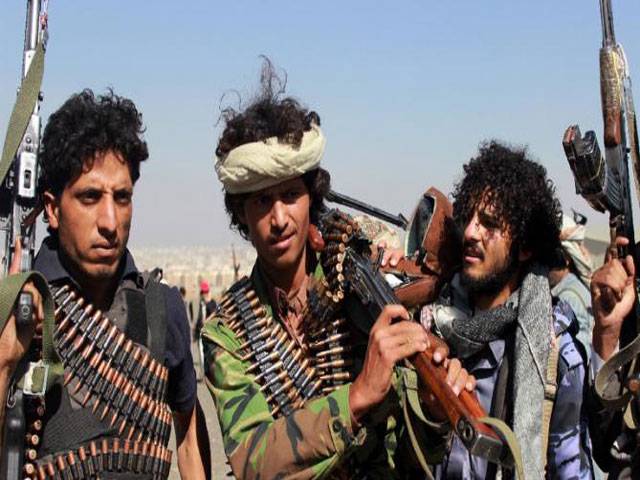ADEN - A ceasefire took effect Tuesday in conflict-ravaged Yemen as warring sides began UN-brokered peace talks in Switzerland, according to the United Nations and the Saudi-led coalition battling Iran-backed rebels.
Limited violations of the truce were reported shortly after it began at midday (0900 GMT), with several mortar rounds hitting government forces in the southwestern province of Taez, according to a Yemeni security official. The Saudi-led coalition, which launched an air war against the Huthi Shia rebels and their allies in March, said the ceasefire had started as scheduled following a request by Yemeni President Abedrabbo Mansour Hadi.
The rebel forces, who control the capital, have yet to say if they will abide by the truce. The UN envoy to Yemen, Ismail Ould Cheikh Ahmed, hailed the halt in fighting as "a critical first step towards building a lasting peace in the country."
He said that the talks in Switzerland "seek to establish a permanent ceasefire and pave the way for a return to a peaceful and orderly political transition."
UN spokesman Ahmad Fawzi confirmed that the talks had begun at an undisclosed location.
"The UN-sponsored consultations aimed at finding a durable settlement to the Yemen crisis started today in Switzerland," he told reporters.
"These consultations seek to establish a permanent and comprehensive ceasefire, secure improvements to the humanitarian situation and a return to a peaceful and orderly political transition," he added.
Fawzi said 12 negotiators and six advisers made up each of the two delegations taking part in the talks.
Ahead of the truce, clashes shook the flashpoint city of Taez and coalition warplanes bombed rebel positions.
Even after the ceasefire took effect, a Yemeni security official reported five mortars targeted pro-Hadi forces in Shuraija, south of Taez. Resident reported hearing shelling in the city.
The coalition has warned that it "reserves the right to respond in case of any violation".
Hadi has declared his government's intention to have a seven-day truce to coincide with the peace talks and to be "renewed automatically if the other party commits to it," the coalition said.
A Yemen presidential statement said the proposed ceasefire "comes out of keenness to grab any chance to achieve peace, to reduce the suffering of our people in Yemen and to end bloodshed."
A lull in fighting is sorely needed in the Arabian Peninsula's poorest nation, where the UN says an estimated 80 percent of the population requires humanitarian aid.
More than 5,800 people have been killed in Yemen - about half of them civilians - and more than 27,000 wounded since March, according to the UN.
Yemen's conflict pits pro-government forces backed by the coalition against the Huthis and renegade troops loyal to ex-president Ali Abdullah Saleh.
Previous UN efforts have failed to narrow differences, and past truces were broken.
Militants, including the Islamic State group, have exploited the violence, gaining ground and carrying out deadly attacks against both sides.
Ahead of the ceasefire, coalition warplanes bombed rebel positions in Taez, where clashes raged as rebels attempted to advance towards the loyalist-held northern neighbourhood of al-Zonooj, a military official said.
Warplanes also bombed rebel positions south of Sanaa overnight Monday, witnesses said.
The rebel-controlled Saba News Agency said 10 people were killed and 20 others were wounded in an air raid early Tuesday on the village of Bani Haddad, in the Haradh area of northern Yemen.
The warring sides have agreed to talks despite protracted differences, including over UN Security Council Resolution 2216, which calls for rebels to withdraw from key cities and surrender their weapons.
The government and its Gulf allies say the resolution is a prerequisite for peace.
The Huthis, who have long complained of marginalisation, seized the government headquarters in Sanaa in September 2014, several months after advancing from their northern stronghold of Saada.
They later encroached on the main southern city Aden, forcing Hadi into exile in Saudi Arabia. In November, Hadi returned to Aden and declared it his provisional capital.
Under cover of coalition warplanes and backed by Arab soldiers and heavy weaponry, pro-government forces have recaptured five southern provinces, including Aden, since July.
Saturday, April 20, 2024
Yemen ceasefire takes effect as peace talks begin

8:27 AM | April 19, 2024
8:09 AM | April 19, 2024
New Zealand ram put down after death of elderly couple
April 20, 2024
Netflix beats expectations on profit and subscribers
April 20, 2024
A Tense Neighbourhood
April 19, 2024
Dubai Underwater
April 19, 2024
X Debate Continues
April 19, 2024
Hepatitis Challenge
April 18, 2024
IMF Predictions
April 18, 2024
Kite tragedy
April 19, 2024
Discipline dilemma
April 19, 2024
Urgent plea
April 19, 2024
Justice denied
April 18, 2024
AI dilemmas unveiled
April 18, 2024
ePaper - Nawaiwaqt
Advertisement
Nawaiwaqt Group | Copyright © 2024





